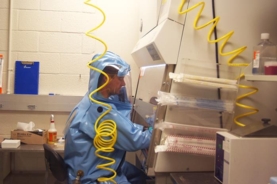You are here
Ebola Free-for-All Could Trigger Bad Science and Wasted Efforts
Primary tabs
Everybody and his uncle, it seems, has an idea of something that might work to cure people infected with the deadly virus
SCIENTIFIC AMERICAN By Helen Branswell Dec. 4, 2014
When it comes to treatments for Ebola, there has been a nearly four-decade-long drought. Nothing in the medical arsenal attacks the virus directly....

Dr. John M. Dye, Jr., U.S. Army Medical Research Institute of Infectious Diseases (USAMRIID) Viral Immunology branch chief, works in a laboratory at the USAMRIID headquarters in Frederick, Maryland. Dr. Dye is leading a team that is conducting a study with nonhuman primates involving the experimental drug ZMapp, an experimental treatment for Ebola patients. Credit: CDC
The current extraordinary outbreak in West Africa provides, really for the first time, a chance to change that. This, the largest outbreak on record, presents an opportunity to test some therapies in the hopes that those caring for future Ebola patients will never again despair at the fact that the best they can offer is a bed, fluids, nutrition and human kindness.
But that drought could give way to a free-for-all if the world is not careful, some experts worry. Driven by the enormity of this epidemic and the prospect of months more to come, there is a sharp desire in some quarters to try almost anything that might help.
It is not a position all endorse. “I think we have to go forward based on scientific evidence, not on belief,” says Martin Friede, the World Health Organization’s team leader for work on experimental Ebola drugs. “There are situations where doing nothing is actually better than doing something that is not justified.”
Read complete article
http://www.scientificamerican.com/article/ebola-free-for-all-could-trigger-bad-science-and-wasted-efforts/



Recent Comments